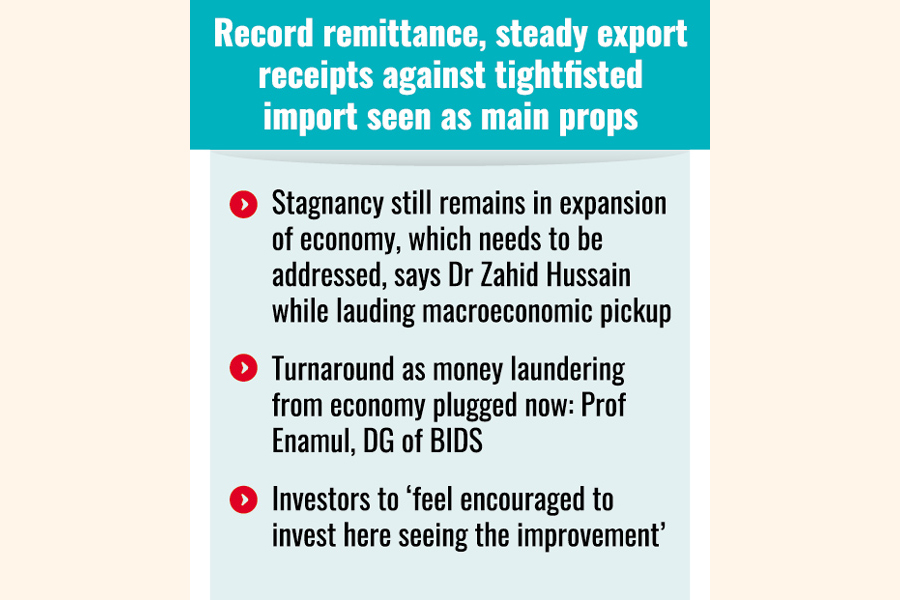EXTERNAL SECTOR REBOUND SHOWS SIGNS OF ECONOMIC PICKUP
BoP reverses into $3.4 billion surplus

Published :
Updated :

Bangladesh sees its deficit balance of payments (BoP) reverse into around $3.4-billion surplus in fiscal year 2025 after three financial years, in early signs of much-needed economic rebound.
Officials and economists hail record remittance and steady growth in export receipts against import contraction for the turnaround in the BoP situation.
After the end of the last financial year (FY'25), the country's BoP registered a surplus of around $3.40 billion in an upswing from $4.30-billion deficit a year ago, according to July-June FY'25 balance sheet on payments released Wednesday by Bangladesh Bank (BB).
Last time the economy of $460 billion saw surplus in overall balance of $9.27 billion was during the covid-19 pandemic time in FY'21. Afterwards, the country's overall balance swerved into a negative territory covering the subsequent three consecutive years - ($6.65billion in FY'22, $8.22billion in FY'23 and $4.30billion in FY'24).
The major driving force significantly improving the BoP in FY'25 was remittance that grew around 27 per cent to $30.33 billion from previous year's count of $23.91 billion.
On the other hand, a steady growth in exports was also observed in the just-past fiscal year with the nation of over 170 billion population having bagged export receipts amounting to $43.96 billion in a year-on-year growth of 7.70 per cent from $40.81 billion.
In terms of import, according to the official data, the country bought in goods worth $64.35 billion in FY'25, which was 1.80-percent higher over previous fiscal's import figure of $63.24 billion.
However, the surplus in financial account got reduced slightly to $3.98 billion from $4.49 billion recorded in FY'24.
Contacted for his view of the macroeconomic upgrade, BB executive director (Grade-1) Dr Md. Ezazul Islam said with the surplus in overall balance, all three accounts - current account, financial account and overall balance-got into a positive territory after three years, which is a "good sign for the economy".
In fact, the central banker said, the overall balance of payments was a concerning part in recent years but it turned positive of $3.39 billion in FY'25.
"So, it's a gain of over $7.0 billion in just a year. The record inflow of remittance, steady growth in export earnings and assistance from multinational donor agencies like the IMF help achieve the turnaround in BoP," he told The Financial Express.
Dr Islam, who leads monetary policy department of the central bank, mentions that the regulator tightened the monetary-policy stance in recent months, which supports stability on the foreign-exchange market and stops forex bleeding from the reserves.
Talking to the FE, Director-General of Bangladesh Institute of Development Studies (BIDS) Prof A.K. Enamul Haque said the significant improvement in BoP is a sign that the interim government has been able to stop money laundering from the economy.
"It also gives a sign of economic rebound, especially on the external fronts, and I do firmly believe investors will feel encouraged to invest here seeing the improvement," the noted economist said.
Former lead economist in World Bank's Dhaka office Dr Zahid Hussain says this is good news that the BoP turns positive after three years. Apart from robust remittance and steady export growth, the decrease in undocumented outflows in errors and omissions (from $2.85 billion in FY'24 to $1.11 billion in FY'25) plays a significant role in the improvement in the BoP.
"But the concerning part is the investment-driven import is still weak. Whenever it picks up, the surplus will be under pressure," he notes.
The eminent economist opines that the interim government has done a lot better in stabilising the macroeconomic condition but the stagnancy still remains in expansion of the economy, which needs to be taken care of.
After the changeover in state power, he also says, the unofficial channel of remittance is stopped and the country starts enjoying a boom in remittance inflow. But the question arises what will happen once the political government takes charge of the economy.
"So, the central bank is required to intensify its surveillance on illegal hundi operations and possible moves of money laundering by any quarter in the future," the economist suggests.
jubairfe1980@gmail.com


 For all latest news, follow The Financial Express Google News channel.
For all latest news, follow The Financial Express Google News channel.